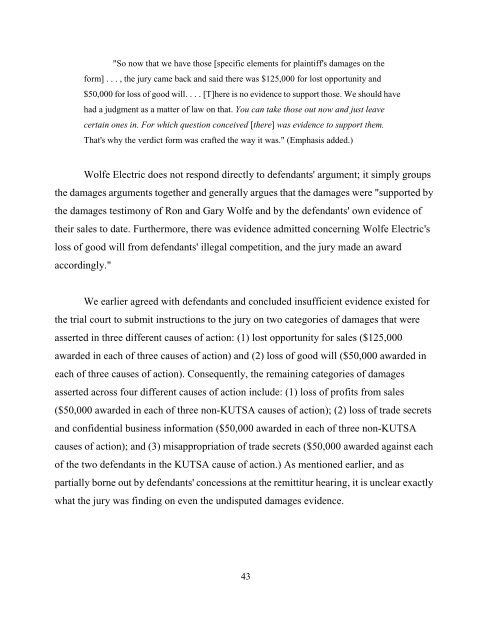Kansas Supreme Court - 99536 â Wolfe Electric, Inc. v. Duckworth
Kansas Supreme Court - 99536 â Wolfe Electric, Inc. v. Duckworth
Kansas Supreme Court - 99536 â Wolfe Electric, Inc. v. Duckworth
You also want an ePaper? Increase the reach of your titles
YUMPU automatically turns print PDFs into web optimized ePapers that Google loves.
"So now that we have those [specific elements for plaintiff's damages on the<br />
form] . . . , the jury came back and said there was $125,000 for lost opportunity and<br />
$50,000 for loss of good will. . . . [T]here is no evidence to support those. We should have<br />
had a judgment as a matter of law on that. You can take those out now and just leave<br />
certain ones in. For which question conceived [there] was evidence to support them.<br />
That's why the verdict form was crafted the way it was." (Emphasis added.)<br />
<strong>Wolfe</strong> <strong>Electric</strong> does not respond directly to defendants' argument; it simply groups<br />
the damages arguments together and generally argues that the damages were "supported by<br />
the damages testimony of Ron and Gary <strong>Wolfe</strong> and by the defendants' own evidence of<br />
their sales to date. Furthermore, there was evidence admitted concerning <strong>Wolfe</strong> <strong>Electric</strong>'s<br />
loss of good will from defendants' illegal competition, and the jury made an award<br />
accordingly."<br />
We earlier agreed with defendants and concluded insufficient evidence existed for<br />
the trial court to submit instructions to the jury on two categories of damages that were<br />
asserted in three different causes of action: (1) lost opportunity for sales ($125,000<br />
awarded in each of three causes of action) and (2) loss of good will ($50,000 awarded in<br />
each of three causes of action). Consequently, the remaining categories of damages<br />
asserted across four different causes of action include: (1) loss of profits from sales<br />
($50,000 awarded in each of three non-KUTSA causes of action); (2) loss of trade secrets<br />
and confidential business information ($50,000 awarded in each of three non-KUTSA<br />
causes of action); and (3) misappropriation of trade secrets ($50,000 awarded against each<br />
of the two defendants in the KUTSA cause of action.) As mentioned earlier, and as<br />
partially borne out by defendants' concessions at the remittitur hearing, it is unclear exactly<br />
what the jury was finding on even the undisputed damages evidence.<br />
43
















